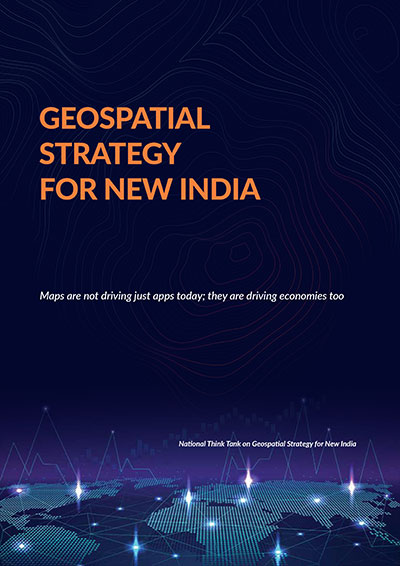Background
Geospatial Strategy Think Tank released the report titled ‘Geospatial Strategy for New India’ in December 2019. Since the release of the report, the socio-economic context of the country has been impacted by the COVID-19 crisis. Henceforth, the priority of the government, as well as the industry, has undergone a major transformation, keeping in view the fact that India needs to restore its economic vitality, build its healthcare ecosystem, ensure livelihood and sustenance for the vulnerable population, migrants and daily wage earners, while at the same time boost the start-up and SME ecosystem.
In view of these significant changes, the Geospatial Strategy Think Tank has voluntarily come together once again to relook at the strategy and outlook of geospatial adoption in the country, specifically focusing on key sectors of importance henceforth. Apart from building networks of partnerships and collaborations, organizing information with regards to geospatial data pool being used/active in the country and assimilating information on innovative use of geospatial for monitoring, tracking and surveillance, delivery of essential commodities and helping migrant workers to receive relief, the Think Tank has decided to bring out ‘Geospatial Strategy for New India ver 2.0’ in August 2020, which relooks at the opportunities, challenges and measures to ensure optimal utilization of geospatial technologies across key sectors.
To ensure the strategy is rooted in the respective sectoral reality, while leveraging geospatial knowledge, the Think Tank has agreed to constitute Sectoral Working Groups that will deep dive into each sector and build the strategy based on the needs assessment, challenges and opportunities for the respective sector. This document outlines the objectives, approach and constituents of the Working Groups.
The sectoral strategies will be used for policy advocacy, capacity development and training of relevant stakeholders in geospatial knowledge and its utility and developing inter-agency/inter-stakeholder collaborations in the country.
Objectives of the Working Group
To develop sectoral geospatial strategy for the identified priority sectors by:
- Defining the value proposition of geospatial technologies across various functions of the sector
- Assessing the potential role and contribution of geospatial adoption within the major programs of the sector and developing a maturity model of geospatial adoption
- Identifying challenges and gap areas towards optimal utilization of geospatial technologies
- Tapping possible collaborations and PPP opportunities in the sector with respect to geospatial technologies use
- Formulating strategies to ensure scalability of geospatial deployment within the sectoral goals
Composition of the Working Group
- 2-3 members of the Think Tank supported by 2 resource from Geospatial Media
- Additional resources from the member organizations are solicited on voluntary basis
- Minimum 5-7 members from the respective user sector representing government agencies, professionals and practitioners as well as research institutes and academicians
Roles and Responsibilities
Responsibilities for Geospatial Media Secretariat Team:
- Review of literature and identifying major programs and stakeholders mapping
- Engage and interact with the sector experts
- Release a working paper on geospatial value proposition supported by case studies
- Organize virtual roundtables with relevant organizations/actors
- Hold one-on-one meetings and interactions
- Map the missing elements and build the strategies
Responsibility of the Working Group:
- Provide suggestions on relevant professionals and experts for the roundtable meeting/individual interviews
- Guide Geospatial Media team on the key issues in the sector and the use/challenges/opportunities/policy requirements for development of discussion paper/strategy document
Sectoral Working Groups
| Sectors | Geospatial Media Team | Think Tank Members |
| Healthcare |
Shreya Chandola Neeraj Budhari |
Vishnu Chandra Dr. Raj Kumar Khatri |
| Land Administration |
Abhishek Kotangale Anamika Das |
Pramod Kaushik Mr. Hukum Singh Meena Raj Alla |
| Agriculture |
Anshita Rawat Ruben Jacob |
Dr. P G Diwakar Dr. V K Dadhwal |
| Ecology and Environment |
Megha Datta |
Dr. Debpriya Dutta Jagdeesh Rao Mr. Anoop Singh Dr. Subhash Ashutosh |
| Water Resource Management |
Tuba Zahra Amit Roshan |
Dr. Shailesh Nayak Dr. K J Ramesh Arun Bhardwaj |
| Urban Transformation and Smart Cities |
Kasiranjan Mahalingam Titas Roy |
Agendra Kumar Pratima Joshi |
| Supply Chain and Logistics |
Sarah Hisham Tarun Kumar |
Nikhil Kumar Srinibas Pattnaik |
| Transport Infrastructure |
Deepali Roy Siddharth Verma |
O P Agarwal Kaushik Chakraborty Rajan Aiyer Amit Ghosh |
| Disaster Management |
Ananya Narain Prashant Joshi |
Lt Gen AKS Chandele |
